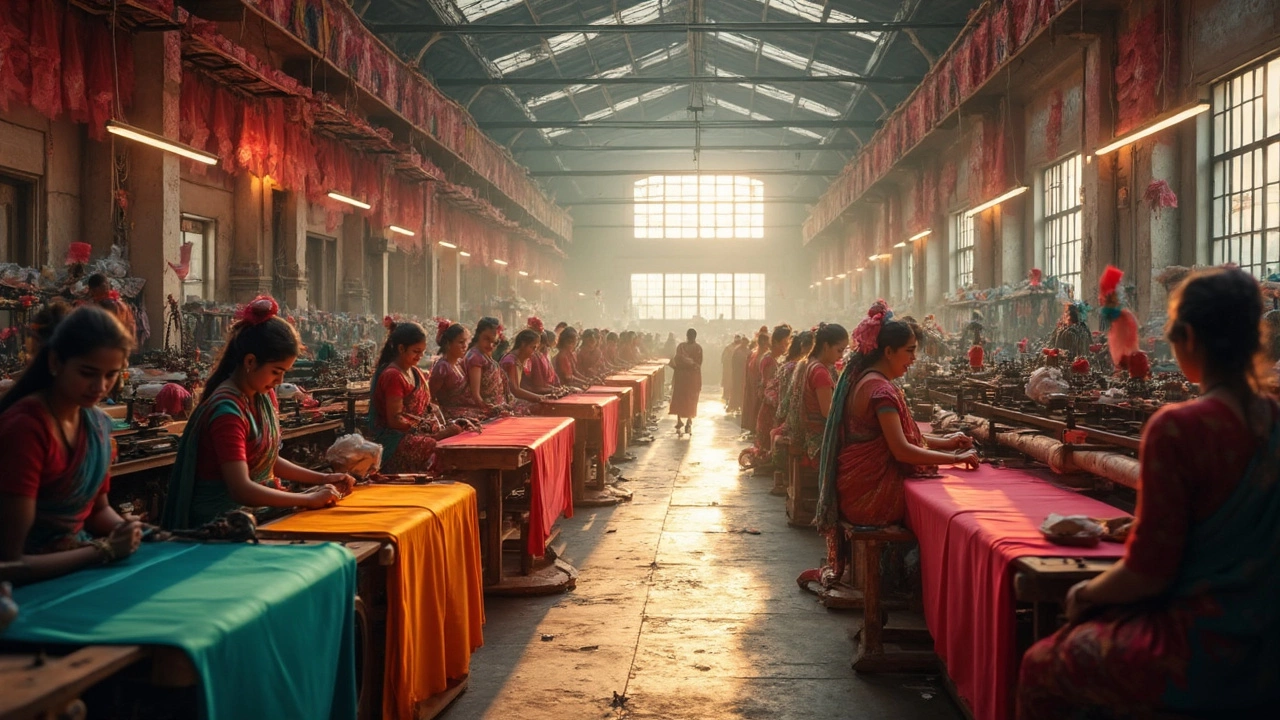Did you know that India has one of the largest textile industries in the world? With such a vast market, finding the top player might seem like searching for a needle in a haystack—yet there's one company that stands head and shoulders above the rest. Let's dig into this to uncover the leader of the Indian textile world.
If you're at all familiar with the textile scene in India, you've likely heard of Reliance Industries. Yeah, these guys are not just about oil! They've transformed the textile game with their innovative fabrics and sustainable practices. They’re pretty much the rock stars of the textile universe in India, setting standards others only dream of.
- Indian Textile Industry Overview
- The Leader of the Pack
- What Sets Them Apart
- Insider Tips for Choosing Textile Manufacturers
Indian Textile Industry Overview
Okay, let's get one thing straight: the Indian textile industry is huge. Like, really huge. We're talking about an industry that's a big chunk of India's GDP and a giant in terms of employment too. It's like the heart and soul of the country's economy, and it’s been around for centuries. No kidding, India's textile history goes way back to when people were trading spices and herbs.
The country is known for a wide variety of fabrics, from silk and cotton to high-tech synthetic stuff you might find in your favorite sports gear. And while countries like China give it a run for its money, India stands out because of its unique mix of traditional craftsmanship and modern technology.
What’s really wild is that the textile industry forms around 15% of India's total exports. Yeah, it’s that big a deal. Wondering about some big names in this game? You can’t miss out on names like Reliance Industries and Raymond Ltd. They’re not just making waves locally but are also huge on the global stage.
If you're curious about some numbers, here's a quick snapshot:
| Aspect | Stats |
|---|---|
| Contribution to GDP | About 2.3% |
| Employment | Over 45 million people |
| Exports | 15% of total exports |
This industry's all about adapting to change too. Whether it's going green or hopping on sustainability trends, top textile manufacturers in India are continuously evolving. This keeps them afloat in a rapidly changing world where trends switch up quicker than ever.
The Leader of the Pack
When we talk about the top textile manufacturers in India, Reliance Industries comes up in every conversation, and not without reason. Founded by Dhirubhai Ambani, this company has grown from a small start-up into a global powerhouse. But how did they achieve this level of success in such a competitive market?
Reliance's journey in the Indian textile industry started way back in the late 1960s. What set them apart was their knack for integrating technology with textile manufacturing, which was pretty revolutionary back then. They are big on polyester production, and their Vimal brand is pretty much synonymous with high-quality fabric in India.
A big part of what makes Reliance stand out is their push for sustainability. They've invested heavily in eco-friendly processes, ensuring that their textiles are not only top-notch but also kind to the planet. It’s something to think about, especially if you're all about reducing environmental footprints.
Here's something cool: Reliance Industries isn't just about the numbers. However, speaking of numbers, they reported revenues well into billions in the last fiscal year. Their strategy includes leveraging economies of scale, and they’ve got sprawling facilities that churn out thousands of tons of fabric. Imagine a massive factory floor with machines whirring away—it's efficiency on steroids!
Reliance Industries also keeps innovation at the core by regularly launching new fabric lines suited for modern needs—be it wrinkle-free, stain-resistant, or even smart fabrics. That's like having a wardrobe straight out of a sci-fi movie.
- Investment in technology has been a game-changer for them, constantly keeping them ahead of the industry.
- Their commitment to quality and continuous improvement aligns perfectly with evolving consumer preferences.
- By keeping the customer's needs at the forefront, they've managed to maintain and grow their loyal customer base.
So, when talking about the No 1 textile company in India, Reliance Industries is right up there, not just because of their size, but because of their focus on blending innovation with tradition.

What Sets Them Apart
Reliance Industries is practically a powerhouse when it comes to the Indian textile industry. So, what makes them the top textile company in the area? It’s not just about slapping a label on some clothes and calling it a day. They’ve got a few tricks up their sleeves that really elevate their game.
Innovation and Technology are at the core of their operations. While others might be weaving the same old yarns, Reliance is pushing the boundaries by integrating cutting-edge technologies in fabric production. Whether it's using eco-friendly fibers or developing smart textiles, these innovations ensure they stay ahead of the curve.
Sustainability isn’t just a buzzword for them—it’s a commitment. They’ve introduced processes that cut down on water usage by almost 30%, and that’s a pretty big deal in a country where water can be a scarce resource.
Here’s something cool—a company report from 2024 showed that their energy-efficient methods reduced carbon emissions by 20% compared to the previous year. Talk about setting an example in the industry!
They also focus heavily on quality control. Each step, from spinning to finishing, is monitored for consistency. This means when you get a product with their name on it, you're getting reliable quality every time.
But it doesn't stop at the production line. Employee practices are top-notch, with initiatives that include training programs to ensure all workers are up to speed with the latest technologies and safety practices. Happy workers mean better productivity, and these guys have figured that out.
In essence, it's a blend of technology, sustainability, and strong business practices that lets Reliance Industries shine as the No. 1 textile company in India. Their attention to detail and drive for excellence really set them apart in this competitive landscape.
Insider Tips for Choosing Textile Manufacturers
Picking the right textile manufacturers in India can be a bit like finding the perfect pair of jeans—it takes time and a bit of know-how. So, how do you make sure you're teaming up with the best in the business?
First off, think about the material. Does the manufacturer specialize in the type of textile you need? Whether it's cotton, polyester, or something more niche, make sure they have a track record in that fabric. It's not just about saying they can; they must have the portfolio to prove it.
Dive into their sustainability practices, too. It's 2025, and going green isn’t just a trendy buzzword—it's a must. Great manufacturers are investing in eco-friendly techniques, like using organic materials and reducing water consumption. Not only is this better for our planet, but it also often means better quality in the long run.
Communication is also a biggie. You want to work with folks who are responsive and transparent. If they're dodgy about timelines or sketchy on costs, consider it a red flag. Find out what others are saying about their customer service, too—sometimes, review sites can be your best friend.
Price, of course, matters. But it’s not always about getting the cheapest deal. It's about value. Make sure you're getting quality for your cash and that there are no hidden fees that pop up later.
- Check specialization in fabric types.
- Evaluate sustainability practices.
- Prioritize clear communication.
- Focus on value over cost.
Lastly, if you’ve got the option, visit their facilities. Seeing their process up close and personal can be a game-changer. You get a real sense of their capabilities and commitment to quality.
If you keep these tips in your back pocket, navigating the world of Indian textile manufacturers can be a whole lot smoother—and maybe even a bit fun!
